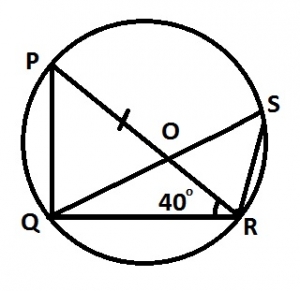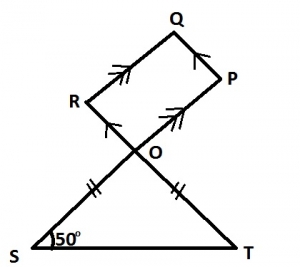Year :
2000
Title :
Mathematics (Core)
Exam :
WASSCE/WAEC MAY/JUNE
Paper 1 | Objectives
21 - 30 of 48 Questions
| # | Question | Ans |
|---|---|---|
| 21. |
The probabilities that Kodjo and Adoga pass an examination are \(\frac{3}{4}\) and \(\frac{3}{5}\) respectively. Find the probability of both boys failing the examination A. \(\frac{1}{10}\) B. \(\frac{3}{10}\) C. \(\frac{9}{20}\) D. \(\frac{2}{3}\) Detailed SolutionP(Kodjo passing) = \(\frac{3}{4}\); P(Adoga passing) = \(\frac{3}{5}\)P(Kodjo failing) = \(\frac{1}{4}\); P(Adoga failing) = \(\frac{2}{5}\) P(both fail) = \(\frac{1}{4} \times \frac{2}{5}\) = \(\frac{1}{10}\) |
|
| 22. |
Which of the following statement is not true about a rectangle? I.Each diagonal cuts the rectangle into two congruent triangles. II. A rectangle has four lines of symmetry III. The diagonals intersect at right angles A. I and II only B. III only C. II only D. II and III only |
B |
| 23. |
 In the diagram, PQRS is a circle center O. PQR is a diameter and ∠PRQ = 40°. Calculate ∠QSR. A. 30o B. 40o C. 45o D. 50o Detailed Solution < Q = < R (OQ = OR = radii) < QOR = 180° - 2(40°) = 100° < QSR = < RPQ = \(\frac{1}{2}\) < QOR = \(\frac{100}{2} = 50°\) |
|
| 24. |
Each side of a regular convex polygon subtends an angle of 30° at its center. Calculate each interior angle A. 75o B. 150o C. 160o D. 68o Detailed Solution Interior angle = 2(75°) = 150° |
|
| 25. |
If the interior angles of hexagon are 107°, 2x°, 150°, 95°, (2x-15)° and 123°, find x. A. \(57\frac{1}{2}^{\circ}\) B. \(65^{\circ}\) C. \(106^{\circ}\) D. \(120^{\circ}\) Detailed SolutionSum of interior angle in a hexagon = (6 - 2) x 180°= 720° \(\therefore\) 107° + 2x° + 150° + 95° + (2x - 15)° + 123° = 720° 460 + 4x = 720 \(\implies\) 4x = 720 - 460 4x = 260° \(\implies\) x = 65° |
|
| 26. |
 In the diagram, POS and ROT are straight lines, OPQR is a parallelogram. |OS| = |OT| and ∠OST = 50°. Calculate ∠OPQ. A. 160o B. 140o C. 120o D. 100o Detailed Solution< T = < S = 50° (OS = OT)< SOT = 180° - 2(50°) = 80° < ROP = 80° (vertically opposite angle) \(\therefore\) < OPQ = 180° - 80° = 100° (adjacent angles) |
|
| 27. |
Given that \(x = -\frac{1}{2}and \hspace{1mm} y = 4 \hspace{1mm} evaluate \hspace{1mm} 3x^2y+xy^2\) A. -5 B. -1 C. 4 D. 11 Detailed Solution\(x = -\frac{1}{2}, y = 4\\3x^2y + xy^2\\ 3\left[-\frac{1}{2}\right]^2 \times 4 \times + \left(\frac{-1}{2}\right)(4)^2\\ 3\times \frac{1}{4} \times 4 -\frac{1}{2} \times 16\\ 3-8 = -5\) |
|
| 28. |
Given that \(27^{(1+x)}=9,)\ find x A. -3 B. \(\frac{-1}{3}\) C. \(\frac{5}{3}\) D. 2 Detailed Solution\(27^{(1+x)}=9\\3^{3(1+x)}=3^2\\ 3(1+x)=2\\ 3+3x = 2\\ 3x = -1 x = \frac{-1}{3}\) |
|
| 29. |
If x varies inversely as y and \(x = \frac{2}{3}\) when y = 9, find the value of y when \(x=\frac{3}{4}\) A. \(\frac{1}{18}\) B. \(\frac{8}{81}\) C. \(\frac{9}{2}\) D. 8 Detailed Solution\(x \propto \frac{1}{y}\)\(x = \frac{k}{y}\) \(\frac{2}{3} = \frac{k}{9}\) \(3k = 18 \implies k = 6\) \(x = \frac{6}{y}\) When y = \(\frac{3}{4}\), x = \(\frac{6}{\frac{3}{4}}\) = \(\frac{6 \times 4}{3}\) = 8 |
|
| 30. |
Given that (2x + 7) is a factor of \(2x^2 + 3x - 14\), find the other factor A. x + 2 B. 2 - x C. x - 2 D. x + 1 Detailed Solution\(2x^2 + 3x - 14\)\(2x^2 + 7x - 4x - 14\) \(x(2x + 7) - 2(2x + 7)\) = \((x - 2)(2x + 7)\) The other factor = (x - 2). |
| 21. |
The probabilities that Kodjo and Adoga pass an examination are \(\frac{3}{4}\) and \(\frac{3}{5}\) respectively. Find the probability of both boys failing the examination A. \(\frac{1}{10}\) B. \(\frac{3}{10}\) C. \(\frac{9}{20}\) D. \(\frac{2}{3}\) Detailed SolutionP(Kodjo passing) = \(\frac{3}{4}\); P(Adoga passing) = \(\frac{3}{5}\)P(Kodjo failing) = \(\frac{1}{4}\); P(Adoga failing) = \(\frac{2}{5}\) P(both fail) = \(\frac{1}{4} \times \frac{2}{5}\) = \(\frac{1}{10}\) |
|
| 22. |
Which of the following statement is not true about a rectangle? I.Each diagonal cuts the rectangle into two congruent triangles. II. A rectangle has four lines of symmetry III. The diagonals intersect at right angles A. I and II only B. III only C. II only D. II and III only |
B |
| 23. |
 In the diagram, PQRS is a circle center O. PQR is a diameter and ∠PRQ = 40°. Calculate ∠QSR. A. 30o B. 40o C. 45o D. 50o Detailed Solution < Q = < R (OQ = OR = radii) < QOR = 180° - 2(40°) = 100° < QSR = < RPQ = \(\frac{1}{2}\) < QOR = \(\frac{100}{2} = 50°\) |
|
| 24. |
Each side of a regular convex polygon subtends an angle of 30° at its center. Calculate each interior angle A. 75o B. 150o C. 160o D. 68o Detailed Solution Interior angle = 2(75°) = 150° |
|
| 25. |
If the interior angles of hexagon are 107°, 2x°, 150°, 95°, (2x-15)° and 123°, find x. A. \(57\frac{1}{2}^{\circ}\) B. \(65^{\circ}\) C. \(106^{\circ}\) D. \(120^{\circ}\) Detailed SolutionSum of interior angle in a hexagon = (6 - 2) x 180°= 720° \(\therefore\) 107° + 2x° + 150° + 95° + (2x - 15)° + 123° = 720° 460 + 4x = 720 \(\implies\) 4x = 720 - 460 4x = 260° \(\implies\) x = 65° |
| 26. |
 In the diagram, POS and ROT are straight lines, OPQR is a parallelogram. |OS| = |OT| and ∠OST = 50°. Calculate ∠OPQ. A. 160o B. 140o C. 120o D. 100o Detailed Solution< T = < S = 50° (OS = OT)< SOT = 180° - 2(50°) = 80° < ROP = 80° (vertically opposite angle) \(\therefore\) < OPQ = 180° - 80° = 100° (adjacent angles) |
|
| 27. |
Given that \(x = -\frac{1}{2}and \hspace{1mm} y = 4 \hspace{1mm} evaluate \hspace{1mm} 3x^2y+xy^2\) A. -5 B. -1 C. 4 D. 11 Detailed Solution\(x = -\frac{1}{2}, y = 4\\3x^2y + xy^2\\ 3\left[-\frac{1}{2}\right]^2 \times 4 \times + \left(\frac{-1}{2}\right)(4)^2\\ 3\times \frac{1}{4} \times 4 -\frac{1}{2} \times 16\\ 3-8 = -5\) |
|
| 28. |
Given that \(27^{(1+x)}=9,)\ find x A. -3 B. \(\frac{-1}{3}\) C. \(\frac{5}{3}\) D. 2 Detailed Solution\(27^{(1+x)}=9\\3^{3(1+x)}=3^2\\ 3(1+x)=2\\ 3+3x = 2\\ 3x = -1 x = \frac{-1}{3}\) |
|
| 29. |
If x varies inversely as y and \(x = \frac{2}{3}\) when y = 9, find the value of y when \(x=\frac{3}{4}\) A. \(\frac{1}{18}\) B. \(\frac{8}{81}\) C. \(\frac{9}{2}\) D. 8 Detailed Solution\(x \propto \frac{1}{y}\)\(x = \frac{k}{y}\) \(\frac{2}{3} = \frac{k}{9}\) \(3k = 18 \implies k = 6\) \(x = \frac{6}{y}\) When y = \(\frac{3}{4}\), x = \(\frac{6}{\frac{3}{4}}\) = \(\frac{6 \times 4}{3}\) = 8 |
|
| 30. |
Given that (2x + 7) is a factor of \(2x^2 + 3x - 14\), find the other factor A. x + 2 B. 2 - x C. x - 2 D. x + 1 Detailed Solution\(2x^2 + 3x - 14\)\(2x^2 + 7x - 4x - 14\) \(x(2x + 7) - 2(2x + 7)\) = \((x - 2)(2x + 7)\) The other factor = (x - 2). |